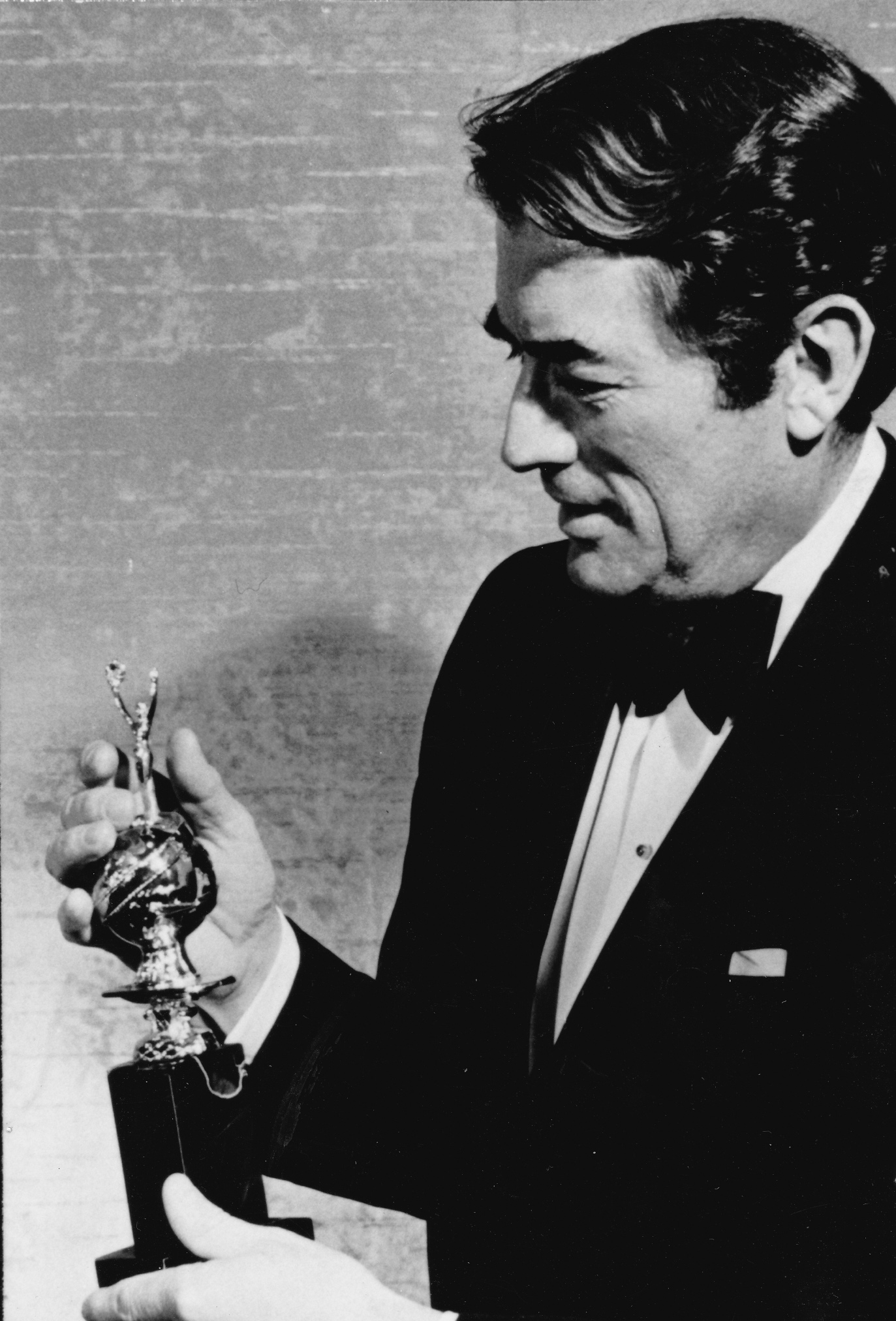
- Cecil B. DeMille
Ready for My DeMille: Profiles in Excellence-Gregory Peck,1969
Beginning in 1952 when the Cecil B. DeMille Award was presented to its namesake visionary director, the Hollywood Foreign Press Association has awarded its most prestigious prize 66 times. From Walt Disney to Bette Davis, Elizabeth Taylor to Steven Spielberg and 62 others, the DeMille has gone to luminaries – actors, directors, producers – who have left an indelible mark on Hollywood. Sometimes mistaken with a career achievement award, per HFPA statute, the DeMille is more precisely bestowed for “outstanding contributions to the world of entertainment”. In this series, HFPA cognoscente and former president Philip Berk profiles DeMille laureates through the years.
Hands down, Gregory Peck has to be the nicest actor that ever won the Cecil B. DeMille award.
Always a gentleman, at his numerous HFPA press conferences he was always polite, charming and unassuming. Cary Grant never won a lifetime achievement award but he sparkles on the screen. Peck, on the other hand, can be rather staid, something he himself admitted at his last HFPA press conference. “Twelve O’Clock High was the first time I felt I did a top-flight major league job, even though I had been in pictures for five years and had made eleven pictures. Before that, I was learning, trying to find a way to be believable on screen.”
However, because he has so many great films in his oeuvre, he was more than deserving of that lifetime honor. At that HFPA press conference, when asked if David O. Selznick had discovered him, he politely rejected that claim. “I’d have to say, without sounding egotistical, that I discovered myself. The hard part was getting on Broadway. That took five years, and there were times that I slept on a bench in Central Park because I was flat broke. There were also times when I thought this was hopeless, that I’d better get back to my father’s drugstore in La Jolla, Calif.
“But through a stubborn streak, I stayed with it, eventually getting small parts, in touring companies, and then the lead on Broadway in a play by Emlyn Williams called The Morning Star. Now if Mr. Selznick bought a ticket and came to see me, well, I was already there. Besides which, both Hal Wallis and Louis B. Mayer had earlier offered me seven-year contracts which I declined.”
He eventually signed a multi-picture deal with both Selznick and Darryl F. Zanuck at Fox and he was off to the races.
For five years every award-worthy film starred Gregory Peck beginning with Keys of the Kingdom, Valley of Decision, Spellbound, Duel in the Sun, The Macomber Affair, The Yearling and culminating in Gentleman’s Agreement, which won both the Golden Globe and the Oscar as best film. He was paired with every top actress in Hollywood including Greer Garson, Ingrid Bergman, Jennifer Jones, Jane Wyman, Joan Bennett, and Dorothy McGuire.
After that initial run when he was Hollywood’s most popular star, he earned strong reviews and Golden Globe nominations for Twelve O’Clock High, The Gunfighter and Captain Horatio Hornblower, three of his six best movies he named in our interview.
After that, against his better judgment, Zanuck convinced him to star in box office spectacles and reluctantly he made David and Bathsheba and The Snows of Kilimanjaro, both with Susan Hayward and both wildly successful.
His most memorable role from this period was playing the newsman in William Wyler’s Roman Holiday which introduced a then-unknown Audrey Hepburn to the screen. Paramount wanted his name above the title, but being the gentleman he was, he insisted they share above the title billing and overnight she became a major star.
For the rest of the decade, he cherry-picked his roles and most of them were respectable hits. The ones that most gained traction were The Man in the Gray Flannel Suit, Designing Woman, and On the Beach. The Big Country gave him a chance to work again with Wyler; in the 1960s, Cape Fear scared the daylights out of audiences mainly thanks to Robert Mitchum’s performance, and The Guns of Navarone was his biggest box office hit.
The Boys from Brazil allowed him his first villain role, and John Huston’s ambitious Moby Dick afforded him his biggest acting challenge, but it was To Kill a Mockingbird that provided him with his most beloved role and earned him finally both a Golden Globe and Oscar as best actor.
He made many movies after that; The Omen was an expected hit which spawned dozens of copycat chillers. He remained a star for the next 20 years until 1989 when he accepted a supporting role in Jane Fonda’s Old Gringo, his last decent role in which he played the writer Ambrose Bierce.
He received numerous lifetime awards besides the Cecil B. DeMille, including the Academy’s Jean Hersholt Humanitarian Award. He was awarded the US Presidential Medal of Freedom. In 2003, his portrayal of Atticus Finch in To Kill a Mockingbird was named the greatest film hero of the past 100 years by the American Film Institute.
He died at age 87 on June 12, 2003, in Los Angeles, California.

